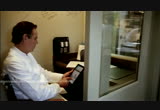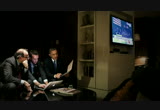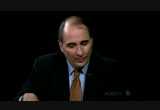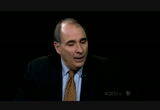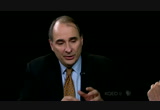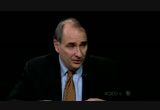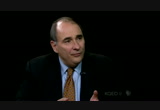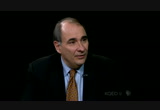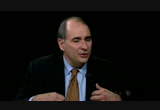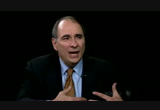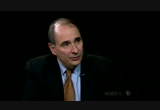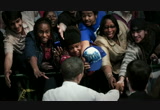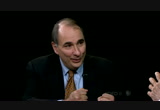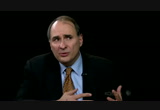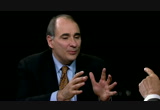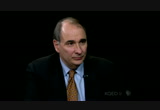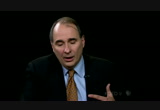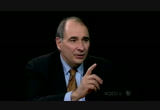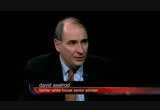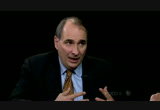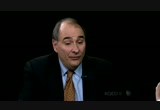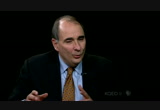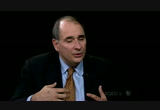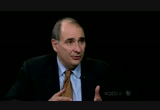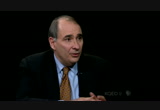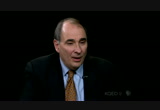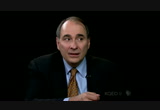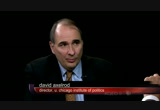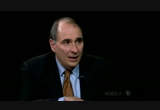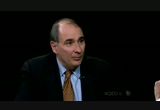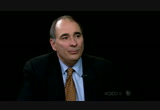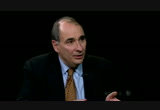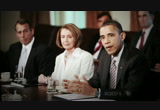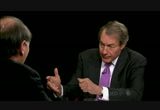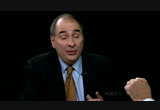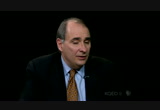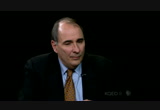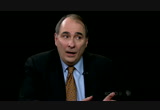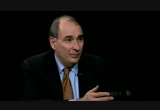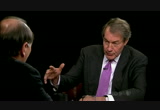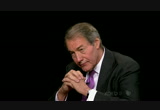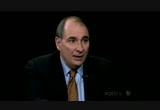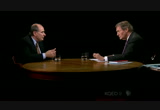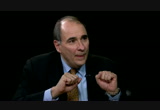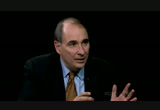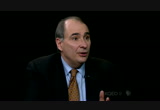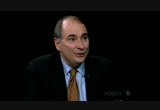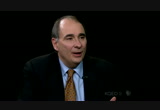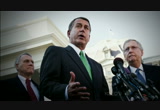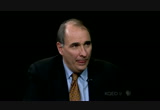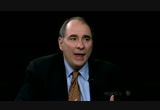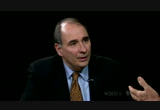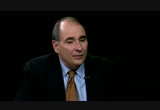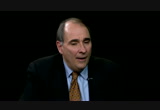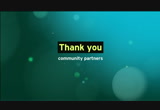tv Charlie Rose PBS January 11, 2013 12:00pm-1:00pm PST
12:01 pm
captioning sponsored by rose communications from our studios in new york city, this is charlie rose. . >> rose: david axelrod is here, the strategist who lead barack obama's two successful presidential campaigns. for year he has got his scores of top democrats into office. also served as a senior advisor to the white house. now he says he left campaigning for ago dem ya, the first director of the university of chicago's institute of politics. i am pleased to have the david axelrod as we look
12:02 pm
forward to the presidency inraise. welcome. >> thank you, good to be here, charlie. >> when you go to this inauguration, what are you going to feel? >> well, you know, i guess i will feel a little of what i felt when i stood beside the stage in des moines when the president was making his last campaign speech this year, late at night on the eve of the election. i will be thinking about the journey that we've taken together. we, you know, i met barack obama 20 years ago. and we've been working together now for ten. and in a sense we came together at a time when we both were going through a kind of midlife professional crisis. he wondering whether he should continue in politics, me wondering whether i wanted to continue as a consultant because i felt it was becoming so hard edged and cynical. and i said to him after the election, i said he gave me my idealism become and i'm really grateful for that. so i will be thinking about
12:03 pm
the journey we took together. >> rose: he is an idealistic man. >> i believe he is. he's pragmatic. you know, i think he's very, very pragmatic. and that's a great quality in a very complicated worldment but he's in public life for a reason. charlie, the world separates-- world politics separates into two categories. the people without go into it because they want to be something. and the people without go into it because they want to do something. he could have done anything but he chose to do this because he wanted to do something to improve his community, to improve the country, to improve the world. and i admire him for that. >> rose: when do you think he made that decision? >> i, well, obviously i think one of the pivotal moments in his life was when he decided after college to turn down corporate jobs and go work as a community organizer on the south side of city chicago. and then again when he came back to chicago, having been the editor of the harvard
12:04 pm
law review and decided to teach and practice civil rights law. and lead a voter registration drive rather than cashing in on his degree. i think those were fundamental choices for him. >> rose: and he was looking for a way to engage in public service rather than take an easy corporate route in high demand with high salary. >> i think he felt that the most rewarding life was one in which you could make a greater difference than just in your own realm, your own level of comfort. >> rose: i want to come back to him and lots of questions about him. but go back to where you are. so you are going to leave politics and just study. >> i'm going to leave campaigns. actually, it's sort of a causei academic position. because what i've done with the university of chicago is create an institute of politics much like the one at harvard and some other-- . >> rose: you mean like the kennedy school. >> well, the kennedy school is one thing. but the iop was something the kennedy school started at harvard to expose young people to practitioners in politics, to encourage them
12:05 pm
to go into the public arena as candidates, as strategists, as policymakers, as journalists. an i went to the university of chicago 40 years ago. one of my frustrations, great institution, was that there were no outlets for engagement. it was a very much of an inward looking place. and i wanted to create opportunities for young people there to interact with policymakers, politicians, for example, tom brow caw is coming in the next few days to do a panel on the politics of guns. and we're going to be running a constant stream of programs like that. and give the kids a chance not just to hear the discussion but to interact with the people who are making decisions and covering those decisions. >> one of your, i think, criticisms of the media has always been, you know, we are too focused on the horse race. and therefore it gets in the way. is that your judgement? >> oh, absolutely.
12:06 pm
you know i'm speaking as one who covered campaigns as a young journalist. >> rose: as a political reporter. >> yes. but i think it's increasingly become so because of the changing nature of media, the proliferation of public polls, the fascination is on who is up and who's down. i, one of my recollection in the white house that i will never forget is i did a little off the record session with a reporters. and one very distinguished reporter said to me, well, what are you going to do about the recovery act. i said what do you mean what are we going do about it. and this reporter said well, it's a failure. >> and i said well what dow mean it's a failure. and the reporter said said well, only 38% of americans approve of it. and i said no, that's not why we did it. we did it because the country was in a freefall and we wanted to pull out of that freefall and save our economy from a second grade depression. and by that standard, it's been a great success. >> rose: here's the other problem though. i mean constantly the argument is made that if the
12:07 pm
politicians would simply be candid, authentic and tell us exactly what they believe, that america would respond to leadership. but you guys don't believe that. >> no, that's not true. i think the president, you know, when i think about our first term in the two years that i was in the white house, i was the keeper of the polling data. i mean i'm out of the political realm and my job was to tell the president what public opinion was. he was rarely, you know, moved by it. but when we sat in a room and he was making a decision about the auto bailout, i said to him, you know mr. president, even in michigan people are opposed to this i wasn't really making a recommendation but he needed to know. and he said i under-- understand that but are we going let a million jobs go in the mith of this depression. he went out and made that case. the recovery act, you know, obviously on health care that was a very difficult fight so when i look at barack obama, i look at someone who was willing to
12:08 pm
make some very difficult decisions at a pivotal moment for our country. and spend his political capital to do that. >> rose: let me talk about 2008 and 2012. how are they different for you? >> uh-huh. well, 2008 was kind of once in a lifetime deal where all the forces aligned. we had the wind at our back. it was almost frightening, actually. >> did you know that before iowa? >> well, we-- no. it sort of took off in the fall of 2,000 and-- 2007 when you could really feel it and you also saw it, there were other indications. we raised a phenomenal amount of money on-line just, you know, just so many americans invested in him. these young people volunteering. you know, when we talked about the race i said to then senator obama that he wasn't old enough to remember, but i remembered robert kennedy's campaign at which as a young man i was a
12:09 pm
volunteer. and the idealism that young people felt at that time. i said we really haven't seen that much since. and we ought to create something like that. if we could do that we will have accomplished something. and so you began to sense that when are you talking to these young people. but really, you know, by the end when you show up and there would be 100,000 people waiting for you, it was almost surreal. and it was -- and you could see the challenge that was associated with that. because there was so much, so many expectations and so much hope poured into that moment at a time when the country was in such-- turning into a desperate strait that the notion that you could fulfill all of that was daunting, even before the election came, we had those discussions. >> i think that, if you look at that campaign, it was a case where this campaign and this narrative that you had, didn't create but you had this narrative and you
12:10 pm
expressed it made the country feel that it was tolerant, young, optimistic. and had a future future. and that was something the country yearned for. i means there aes a thing in politics which you understand and i don't, but the political years have a time in which the right person comes at the right moment. >> yes, yes, absolutely. >> and you have to choose your time because or it chooses you and you don't necessarily choose it. >> right. >> rose: and if you don't accept it then you lose your opportunity. >> right. well, we had that discussion when he was trying to decide whether to run. and you know i said that the mistakes that people have made in presidential politics are rarely because they ran too soon. they are almost always because they ran too late. and that when the moment arrived you have to, you know, recognize it. and he was the right person because the country so profoundly needed a change
12:11 pm
from what we had. and he represented the most, the starkest change from what we had. but this last section, you know, one thing that was missed in the 20089-- 2008 election is that there was a theme in that election and that goes back to his convention speech in 2004 that was very important about the viability of the american dream. and that continues to be the great challenge for us in a changing economy. >> right. >> how do we make economic mobility possible. how do we maintain a strong vibrant middle class. and that, you know, the crisis exacerbated that problem. and in this campaign we really focused a lot of attention on that. so there is a threat of continuity between all of it. >> rose: does there have to be an authenticity of person to be able to be able to strike that cord that robert kennedy did? >> my whole political career was as a consultant and strategist was predicated on the notion that you have to
12:12 pm
build your campaign on the foundation of who your candidate is, that your message is to the going to resonate if it's not authentickically part of who that person is. and so we spent a lot of time at the beginning of the campaign in 200 and 2008 talking about obama's biography and some of the formative experiences in his life. because it gave, it gave life to his message. i think one of the problems that governor romney had in this last campaign was that he made a lot of faustian bargains in order to get the nomination. and people weren't quite sure who he was or what he believed. >> rose: but then you guys helped him decide early on in the campaign. >> well, you know, campaigns being what they are, they are a healthy competition. and we engaged in it. >> rose: i want to come back to that point. in how you spent a lot of money early on to define him. but he has said that in some way 20s 12 was more satisfying because it was a
12:13 pm
confirmation. >> yes. >> rose: of what he had done. >> right. and beyond that, i think that's important. but i think more than that, we had, you know, when you strip all of the noise and sound and fury away, there weren't two distinct philosophies about america, about our economy, i mean 2 was a very healthy debate and it has, it's a long-standing debate about what, you know, about the role of government, the importance of the middle class, you know, whether our economy grows from the top down or from the bottom up. i mean all those things were from the middle up. all of those things were being contested in this election. and so it wasn't just an affirmation of him it was an affirmation of a point of view. and it was also an affirmation of a large america, a diverse america, a forward looking america. and in which that is inclusive. all of those things were on the ballot.
12:14 pm
and it was a hard election for us because at the beginning as you know people probably sat around this table and cast a lot of doubt about our chances. we were navigating through this terribly difficult economy. we went through a horrible spell around the debt ceiling fight. and after that, you know, there were a lot of people who doubted that he could win. so for all those reasons this was in some ways more satisfying even than the last one. >> the romney people thought for a while that they would be able to say he's a nice guy but he's just not able to accomplish things, that was a team that-- theme that they tried out to do. >> yeah. >> the nice guy part got lost but they did make the other case. look, i have some sympathy for them. one of them, let me say after the campaign when you get a chance to know the people on the other side, and we've been in forums together and so on. they are coming out to my institute in february, it is,
12:15 pm
you know, i appreciate them for being in the arena, for caring deeply about the country, caring deeply about their candidate. but one of them said you know when we started, unemployment was at 10.2%. and you know, the case was a pretty easy to make. you know when we finished it was at 7.8% and things were clearly getting better. and it made our message more difficult. >> i know some of them. and they believed in, i think this is the reason for their confidence. they believed in the end, you know, that the economy would defeat. and so therefore that outside factors from whatever campaign they ran would defeat president obama. >> right. >> they had to have confidence. they also had a confidence in polls that i don't understand. do you? >> well, i mean i obviously live in that world. and it's, the question is whether their polls were-- the problem that you had was the same problem in the public polls had.
12:16 pm
the poll was predicate and faulty assumptions. >> these are grown-ups, aren't they. >> they know what they are doing. >> and very talented grown-ups. but there are assumptions about turnout. you know, for example, i looked at the early vote this year which start the late september and in states with large african-american voters the turnout was way newspaper the early vote. gorge gra why we didn't have an organization to speak you have. the turnout was record in african-american voters that just confirmed in our minds that the african-american turnout would be very robust and i aurls believed that. but they continued and a lot of the public polls to weight down some of that turnout. and there were other indications among women, among hispanics that would have caused, and historical trends. we've been getting much more guy verse in our vote every single cycle, the notion of going backyard.
12:17 pm
>> i don't understand why that is not obvious. this is a changing country and the demographics are changing. you don't have to be, you know, a political scientist to know that. >> i know. but there are other factors that they-- you know, they can make their own case but like i said i don't want, having won i don't want to go back and say gee, weren't we smart and weren't they not smart. because i'm always mindful. the axelrod rule is you are never as smart as you are when you win and never as dumb as are you when you lose. >> rose: all right. but they also played things that you sat where you were sitting in chicago saying thank god they didn't come out and try to define him early and they let you define romney early. you must have looked at that and said i can't believe this. >> based on what i said earlier, you know that i-- i always believe that you have to establish who your person is, particularly when are you running for president of the unit the states. >> rose: . >> you cannot be a cardboard cutout and run for president. i think there was an assumption that all you had to do was not be barack obama and that you could win. and i think people needed to
12:18 pm
know more about who mitt romney was. what motivated him. you know, how he would relate to them and how they correlate to him. and they, they made the decision partially because they had a very brutal primary season and they devoted a lot of resources to taking their opponents out. but they made a decision that they didn't have the resources to do that. >> rose: what about the vice presidential choice that they made. >> well, i think that that was not a broadening choice. that to me, when i heard that paul ryan was chosen, i felt that that was a choice that would help them get through their convention because it would be well-received by the base of the party. but it also, it also diverted the discussion from growing the economy and jobs which was their message to a lengthy discussion about medicare and how we should approach that. and you know, ryan had some
12:19 pm
fairly sharp ideaological positions. and he was identified with a very unpopular republican congressman, tomorrow parielo the former congressman from virginia got off one of the best lines in the campaign when he said only mitt romney could look at this congress and say i want the brains behind that operation. so-- . >> rose: yes. if in fact you looked at your campaign and say it is a model for future presidential elections, what would you be arguing for? what would make it that? >> well, obviously you know, one of the hallmarks, there are message related aspects of if. some of which i have spoken about already which is build your campaign around the, who your candidate is. make biography a foundation of your campaign. but just in terms of the nuts and bolts of campaigning, you know, we were ahead of the curve in
12:20 pm
2008. >> use of social med why and everything else. >> and social media progressed exponentially in the four years that passed. and so part of what we did was stay ahead of the curve in term its of what the technology would yield. and we were able to gather more information. and we were able to develop more avenues of communication and use the technology to empower people in the field so we really married the shoe leather campaigns of the past with the technology of the 2 1s century to you know v an interaction with voters that allowed us to mobilize the vote in a very, very effective way. >> were you precise in terms of the way the election turned out and your own internal observations. >> we had a very, very-- we had a very, very impressive and profession ent-- proficient group of young analytics people. and they crunched huge bits of data. and they would run the campaign every night, you know, like 60,000 times.
12:21 pm
and they were literally within a tenth of a point in most of these states of the result. and you know, we have three different runs of this. we had then joel bennettson and his group doing battleground state polling. and then we had individual pollsters in each state doing kind of traditional polling separately. and they all were yielding the same results. so we really went into election day very confident that we were going to win. and the question in our minds was just, you know, what the margin would be. and so there was this tremendous disconnect between the way they were looking at the campaign and we were looking at the campaign. and you know, it was sort of surreal to hear the discussion because we knew what we were seeing. and we felt very confident about it. and yet there was this sense of suspense that we thought
12:22 pm
was unwarranted. and the other side was seemingly very confident too. >> when you watched the first debate you said to yourself what? >> well, i was worried about that first debate from months before because of the history of this. the history is that incumbent presidents tend not to do billion in the first debate and there's good reason for it you haven't debated for four years. you're not used to people getting in your grill. >> because you've been president. >> because you've been president. and now there is a guy standing, you know, four, five, six feet away from you. and he's after you in ways that people haven't been for a while. and there's this sense of why do i have to be here. and you know, we talked about it. and we discussed it. i think intellectually both he and we understood it. and yet we failed. i think we failed to prepare him properly. and perhaps he was not in the right psychological assignment. >> you said the smartest thing i know about that debate.
12:23 pm
you said he came expecting a conversation. >> yes. >> and the governor came expecting to debate. >> right, yes. i mean what i said precisely was he came expecting-- he came to have a discussion and the governor came to give a performance. and you know, mitt romney delivered the lines that he had been practicing for months. >> rose: but the president said before and he hoped that they could have a conversation about the future of america. >> right. >> rose: and this idea about conversation had cent into his own way of looking at this. >> yes. >> rose: it was less there in the next debate. >> yeah. well the reality is presidential debates are not conversational. and you know there is always this aspiration that we will make them conversations, but they're not. you know, they're performances. and you have to yield to the reality of you know, of the event and prepare appropriately, practice your answers, know what you are going to do when subjects come up. know how he's going to come at you. and be prepared to react accordingly. >> rose: did john kerry perform well? >> he did. he did, yeah. he did.
12:24 pm
>> rose: let me finally look at, not finally in this conversation but look at in terms of the race in 2012. what does it is a about the tea party? the election and where they are now in the republican caw sus-- caucus? >> well, you know, i think we have a structural problem in our politics, charlie, in that you have in the republican party, you know, this very strident group that is dominant. and we have our congressional elections and the way districts are aligned now are such that people don't have to run in general elections. generally they just have to win primaries. and the nominating process favors those most strident voices. and we saw it in the republican primary. one of the things that defeated romney he is had to move so far right to be the nominee, on immigration, on women's issues and so on that he essentially invalidated himself with large numbers of voters in
12:25 pm
order to be the nominee. >> rose: voters growing in importance. >> yes. and so you know, we see it playing out in the congress. where i think the readers of the republican party, in candid momentses would say we can't win a national election if we're tacking to the right on all these issues. but in order to maintain their leadership within the party, they have to be responsive to these strident voices. and i think it's a big problem for them. >> rose: is its president going to have an opportunity to be bold in the next four years? >> well -- >> or is he going to be tied down by fiscal issues in four years. >> well, i think that there are a whole range of things on which he's going to have an opportunity to make a big contribution. and you know, first of all, how we solve the fiscal crisis is going to be very, very important this is the argument he has been making from the beginning. the fundamental challenge we
12:26 pm
have is the one we talked about in the campaign, beyond any other challenge which is how do we prepare the american economy for the 21st century in a way that gives the greatest possible opportunity to the largest number of people and allowed the middle class to grow and-- so that means upping our game on education, maintaining our commit oment to research and development and adding to it, continuing our transformation and energy, grabbing the energy sources of the future and dominating them and developing energy independence. but these things are going to require the appropriate priorities and those are reflected in budgets. if all we do is rachet down, you know, essentially close the government down for all intents and purposes so that we're not attending to these things, we're going to have a much less good future so how that debate comes out is important. but there are other issues, immigration reform this very important gun dekbats we're having. the, you know, how we
12:27 pm
effectuate the transition in health care to the health-care reform. there are a lot of issues on which you know, we have to get it right. and he is going to provide the leadership that we need to get it right i believe. >> here's one issue. theodore roosevelt talked about the bully pulpit where it was used. we saw another issue of bill clinton at the convention with the ca passit ot explain and the president began to call him the explain never chief. are there limitations on this president's ability to move the public? >> you know, charlie, when i look at the things that we've accomplished, in part because of his ability to move the public, i would challenge the premise. because -- >> it wasn't a premise t was a question. >> yeah. >> i thought there was a premise behind the question opinions but you know, i think that his, you know t was his ability to persuade
12:28 pm
that allowed us to move forward on health care. health care would have died a thousand times but for barack obama and his commitment to it. >> rose: in the beginning when rahm said don't go for it. >> i think there were several phases alonged way. i went in to him, not to persuade him not to do it but to tell him about polling in the summer of 2009. i went through it and talked about all the water we would be taking on. and he said i know you're right but i just got back from green bay, business business, and i met a woman, 36 years old, two children, married, had insurance, now she has stage four breast cancer and she is hit against her insurance caps and she's frightened that her family, she will die and letter family will go brument in the process. and so he said that's not the country we believe in. let's just keep fighting. and he went and he put that on his back. you know, those seven hours, you talk about explain never chief. how about the seven hours that he spent on television with all the members of
12:29 pm
congress discussing health reform, in great detail. that was, you know, an extraordinary moment when he went and talked to the republican caucus on conversation and-- television. i thoughts was a great moment. i would love to see more of that. so no i don't think there is a problem with his ability to explain. >> rose: to use the bully pulpit and explain, you don't think there is any limitations on that is this. >> i think there are limitations but i done think they are his limitationment i think there are limitations to what any president can do in the modern age. >> do you think some elections results may suggest otherwise that there is as some have suggested some visceral opposition to him? >> well, you know, i think it's important to recognize that there are only six presidents in history who have won two terms with 51% or more of the vote. and barack obama, six. and he is-- and he's one of them. the last one was dwight d eisenhower. so you know, we have always been a closely divided
12:30 pm
country. and-- . >> rose: is it over the role of government. >> i think that that say large part of that, a large part of that debate. and in terms of the visceral nature of the opposition, look, i'm not going to deny that there are elements of who he is and what he represents that may-- that may create some reaction among some people. but for many of them were the same people that reacted viscerally to bill clinton. >> rose: i agree, but was it an issue for you. did you say look, we have to figure out how to get passed this. >> i think that our conviction was always that there was a majority there, for whom this was not an issue. and that there was a majority there for this president and that especially, and that would be especially true if the participation was great among all voters. you know what happened in 2010 was youth voters, for example, under 30 which had been 18% of the electorate
12:31 pm
in 2008 dropped to 12%. well, if that was going to happen in 2012, we were going to lose the election. so our count, we had confidence that the more people participated, the better we would do. so you know, this is-- these visceral divides in our country have been, are historic in nature. but i didn't think they represent the essence of who we are. and we've always worked through them. and i think we can work through them now. but we have to deal with some of the structural issues that impact on our politics. >> rose: like what. >> i mentioned one which is redistricting. i think the way we create districts reduces to almost nothing the number of districts where there are future actually a cross-section of voters. so that rather than just responding to the most strident voices in one's party you have to respond to a broader electorate. that's one. i think you see, the times
12:32 pm
had a great editorial about the rules in the house, you know, for ten years now we've had what is called the hazard rule name ford a speaker from my own state that said he wasn't going bring a bill on to the floor that didn't have a majority of his caucus. that is, that is not the norm. and when you do that, you're guaranteeing the kinds of divides that we've seen, that paralyze a government. the use of the fill buster in the senate is something that has taken on a life of its own. >> rose: you are speaking to the very issue that is at the heart of what people worry about washington. it's the inability or the question of whether it's dysfunctional. and these are the kinds of things that you think might change the dysfunctional i9 of where we are. >> these are among the things that change. >> rose: because minorities can use them. >> yeah, and the senate, obviously, the minorities used it to that wart. >> rose: the filibuster rule. >> and we've gone to a place where we've never gone before.
12:33 pm
a good example are the nominations the president's made for his cabinet. you know, people may have differences with chuck hagel on this issue or that issue. but the guy is like jack armstrong all american. i mean he, you know, he was a war hero. he's lived an exemplary wife. he was a fine senator, highly respected. and he's the president's choice for secretary of defense. >> rose: why is he the president's choice? is it part-- i mean is this president in making the choices he has to make choosing people that he feels really good about, jack lew, john kerry o beyond their abilities, but also because there is some personal relationship there makes him say for the next four years, i really want to accomplish big things, i want people who i really know well, like well, who i believe are where i am? >> well, there's no doubt that he has confidence in them, that he feels,-- that he feels a connection with them, that he feels that they will faithfully execute-- . >> rose: would he have preferred ssz an rice to
12:34 pm
john kerry. >> susan rice say great friend of mine. and i think a spectacular public servant. you have probably spent quite a bit of time with her. i think she's done an outstanding job in her position. i have said, you know, she was clear leigh a strong candidate for secretary of state. she was never, the president never said to me i've decided to choose susan rice or i prefer to choose susan but-- . >> rose: what was he thinking about the nomination. what kind of conversation would you have with the president about who he might nominate for secretary of state? >> well, i'm to the going get into detail about it other than to say that when he picked john kerry it wasn't a grudging choice. it wasn't a second choice. it wasn't-- . >> rose: he was thinking about 9 possibilities. and in the end he chose kerry, for whatever might have transpired. >> yes, yes. i mean i think what was done to susan by some members of the congress was outrage us. but-- . >> rose: john mccain, for example. >> well, i mean, yes, he and others. i think that it was-- it was
12:35 pm
predicated by politics. and not the public interest. but that said, you know, when the president made his choice he made a positive choice, not a grudging choice, because he has known john kerry, he served with john kerry. john kerry's been an extraordinary partner with the administration over the last four years in the foreign relations. >> rose: and has undertaken missions for the president, syria and other places. >> has indeed. so the president has great confidence in him. he knows chuck hagel well, they traveled to iraq and afghanistan together. i think he admired hagel's strength and independence in standing up on some of these issues in the senate. and he i was intrigued by hagel's status as someone who has actually been an enlisted man, two purple hearts, understands the wages of war.
12:36 pm
>> rose: and are friends too, i mean he liked him. >> there's no doubt that he likes him. and i, you know, i think that the fact that they have a good and close working relationship is to the benefit of the country. >> rose: if political journalist and the public at launch doesn't understand something fundamental about what life is like inside the white house, not hours and not fat agency and not all of that, but the way it works, what is it we don't understand? well, i think the gate challenge in the swhous that nothing inconsequence comes there. the president always says if it's easy to solve, it never comes to me. so by definition you know, virtually everything that's being dealt with on a daily basis has, you know s deeply complex and generally impactful. and they come 59 you one after the other. and you have to be prepared, as the president says, to walk and coup gum at the
12:37 pm
same time. the great challenge beyond that though-- . >> rose: the president said that. >> yes. ed great challenge though is that in washington and in the ecodham per of washington every event, no matter who trivial, is treated with this tremendous sense of urgency. this is a defining event this will define the presidency. i always think about the gulf oil leak which was a tremendously challenging problem. and wrecked great havoc on that region. but at the time it was obama's katrina was going to define his presidency. how many minutes, charlie, were devoted to the gulf oil spill in the presidential debates? how much, and the reason of course was that ultimately the president handled it well. the leak was stopped. reparations were being made. bp has spent tens of billions of dollars that they were compelled to spend to make good what they did
12:38 pm
wrong. prosecutions are moving forward. so it was the dog that didn't bark ultimately. but at the moment, it was, washington was in a frenzy this was going define the entire four years. and so what you have to learn in the white house is to keep your wits about you and understand that there are very, that you have to deal with all of it. but that very little of it is the defining issue. >> and in fact what are you doing in one day is going from one issue to another issue to another issue. >> yeah, i mean i remember the day we-- the day we dealt with the auto bailout, early in the administration. the president had a meeting on some national security 3450e9ing on some intelligence from north korea. we had a meeting on the auto bailout that he had cut short to go to the situation room to go to afghanistan. and that is the way the day went. and we convened again at
12:39 pm
6:00 at night had. a long suggestion in which he decided to move forward on the auto bailout and went back to my office and collapsed in my chair. the phone rang and its was rahm's office. gi in there and he says fargo's underwater. fargo's flooding. that is the nature of life in the white house. and it's exhilarating. and you know, you feel that you are involved in meaningful work every second. but it's also, you know, it's challenging. >> rose: what's his day like? i mean much has been said because of the time that michael lewis spent with him and wrote about in "vanity fair" in terms of how he gets up, goes to exercise. has made decisions that make his life more he fish nent terms of clothes and everything, what he eats and all that kind of stuff. >> yes. >> rose: wants to see the family. wants to go up stairs and see the family and then they go to bed. then he spends hours between 10 and 1 doing what 1234. >> reading, writing, reviewing his work for the
12:40 pm
next day. calling folks. when i talk to the matt it's generally, you know, around midnight. you know, now luckily i live in chicago so i get an hour's break on the deal. but so you know, he really is organized his day efficiently. i must say that one of the things that impressed me, because i was trying to keep up, was the fact that he always seemed prepare to me. he was always, always like three steps ahead of people in the room. and was clear that he had read the material, that he had thought about the material. and a lot of that work happens-- happens at night. >> rose: but on foreign policy, which he was least experienced in, seems to, in the judgement of military people i've talked to, have been best. bob gates on this program said to me had the decisional making talent of people that i have rarely seen. so did general mccraven. he said i have seen people
12:41 pm
in the military for 40 years that didn't handle decisions as well as he does. >> no, it was a revelation to he moochlt he's been my friend as i mentioned for a long time. but you never know exactly how people are going to handle these things until you see them. one of the things about that long campaign, though, is what you-- you began to see elements of that. and you know, even on foreign policy, i was thinking about this the other day. we, our campaign began to take off in the summer of 2007 after we had been in a deep hole. when in a series of debates he took some foreign policy decisions that were very distinctive and created quite a bit of controversy. one was he said if i have a high value target al qaeda target in pakistan, i'm going to go after that target. you know, i want the cooperation of the pakistanies but we're going go after that target. that created a big stir. on another occasion. >> yes, and that was the yet
12:42 pm
civil, of course. but then the second one was when he said that he was willing to sit down with hostile leaders. and that he is side a strong country doesn't hesitate to talk. and that created quite a stir. this was during the campaign. >> yes, it actually started before hillary. i mean with all-- joe biden was one of the candidates. a number of other candidates. but you know, when you look back, it was clear that he had thought through these things because they helped, you know, they an nature-- animated some of the decisions that he made later. people asked me what is the most salient quality of barack obama. and there are many. but consistency is a great-- you know, you look back at the things that he has said over the years, and there aren't a lot of mysteries about the decisions that he made. he said he would end the war in iraq. he ended it. he said if he could go after bin laden, essentially he
12:43 pm
was saying, he was going to go do it he said he wouldn't hesitate to sit down at a negotiating table f that was effective. so you know, he didn't-- it wasn't as if he came in and hadn't thought these issues through. but, charlie, on one other point in answer to your question to gates's point, he does have this, a remarkable ability to make consequence, really consequence decisions, having thought them through and heard the discussion and then living with them. he's not a guy who anxiously looks backward once he makes a decision. i was with him the day before its bin laden mission. and i knew nothing about it i wasn't working in the white house. and many who were there didn't know about it i went over to work with him on jokes for the white house correspondent din their night. >> rose: right. >> and he was ash-- . >> rose: i didn't real eye you wrote those jokes. >> i was one of the crew. but he, he was as relaxed, you know. >> rose: at the moment he knew what was coming down. >> he knew that if it failed that not only would there be
12:44 pm
great risk to our security and to the men involved in that mission, but that his political career would likely be over. and yet he was completely calm. and when i learned the next night, in fact, when we were going over the jokes there was one joke about tim pawlenty t was poor tim pawlenty he has such promise except for that unfortunate middle name bin laden. he said bin laden, that's so hackneyed. let's take that out. he said in retrospect, it's tellingly, that's so yesterday, he said. let's take that out. and then the next night when i heard about the raid, i thought my god, he knew when he was sitting there that he had made this decision. he went and performed brilliantly that night at the white house correspondent dinner, not a trace of anxiety o though he must have felt it. and you know that is an important quality in a president of the united states, to be able to make decisions on the basis of the best information you have, and live with those decisions. >> rose: another aspect of
12:45 pm
this in washington is this argument that is often made. lincoln is one example. the fill some about the emancipation and the ament. lyndon johnson is the other example. they say for all the positive things about foreign policy, on dealing with congress he is not as effective as lyndon johnson or abraham lincoln because he doesn't like the give-and-take of it. he doesn't like the trading of it. it's somehow offends him. and he is a bit arrogant and a-- aloof from that process. >> i'm thinking about how the passage of health care and all the criticism we took because people felt we had made deals and we had, you know, made -- >> its drug companies and with senators and so on. and so now the same people say well you know he doesn't really deal enough, he doesn't make deals. he doesn't understand. >> they say he's not in the business of sort of inviting
12:46 pm
congress not white house for different and all that kind of thing. he does not stroke enough. >> i think that. >> it fair skmen tear to say that he doesn't socialize as much, you know, perhaps as others. >> rose: would it have been better if he had or if he had the instinct to do that? would there have been more likely the passing of a grand bargain. because you know as well as anyone that the personal dynamic is an important part of politics. >> yes. >> rose: and certainly johnson understood that. >> right, but charlie, he understands that as well. one of the hallmarks of obama in the state legislature when we were in illinois was that he had great relationships across the aisle and he used to play poker every week with members and so on. now one difference is he was down in springfield. his family was in chicago. and honestly, one difference is he's one of the few president who has actually had young children in the white house. and he does puts a premium
12:47 pm
on going home at night, having dinner with them every single night that he can. >> rose: are you saying we rather have dinner with his family than a bunch of congressman that he is trying to pass legislation. >> that's what i am saying, charlie. >> rose: but here is a guy who calls historians in unannounced to talk about the country. a guy who calls the best journalist in from washington to talk about things. >> yeah, well i think he's interested-- . >> rose: the guy that knows. >> there's no doubt that he's interested in, you know, he's got-- he reads widely. as you want a president to be. and he wants to draw on people. but you know, he hasn't always embraced the customs, you know, the sort of-- the sort of-- . >> rose: would anything have been different if he had? if he was more, do you think the results would have been different. >> charlie, i think about an interview that mitch mcconnell did in january of it 2010 with "the new york times", the extraordinary interview with anna canned carl in which he said we decided from the beginning that we were not going to give him cooperation on any
12:48 pm
major issue because if we did, it would significant my that he had figured it out and we were weren't going let him have that. so when a decision like that is made you can socialize all you want. but if the policy of the other part is-- party is we're not going cooperate because we want to defeat the president and that's primary for us, you, you know, it's hard-- it's hard to say that, you know, marshmallow roasts and hot dogs were going to sol of that problem. >> rose: or playing golf or whatever it might be do. you think that's still the attitude of the people in congress today, mcconnell and boehner? >> i think that-- which i that-- they have to -- >> they wanted to defeat this president but rather than find a solution to the extension -- >> they have to eval y5i9 the efficacy of that strategy because the president is re-elected and re-elected by more than a few votes. the congress is now the standing of the congress is as low as it's been in you know maybe recorded history an we spoke to this bferm they want a majority in the house but a lot has to do
12:49 pm
with redistricting. you take a state like your home state of north carolina. i think we won a majority of votes for congress and we got 27% of the seats because of the way the map was drawn. so you know, question play that game. and really they are saying is we're interested in our own survival and our districts are homogenous republican, they are responsive to the republican interests groups and we're not going -- and so that's the important thing to us, i any if they want to be a national party and win national elections in the future they've got to find a way out of that box. >> rose: as we come to the end of our conversation, what ought to be the conversation about america today? what ought to be the great debate of our time in which men and women of different conviction and experience can agree toot least address
12:50 pm
communication and work towards common ground. what are those big questions that unless we do t they will fail the people, and the country will not be as strong tas can be. >> well, in the grandette formulation n the 20,000 foot formulation is the thing that i talked about before. we the world and our country have gone through enormous changes over the last 30 years, driven by this explosion in technology. that have conspired against the so-called american dream and social mob oil. so you see this great polarization, more rich, more poor, a middle class, struggling. i think the great challenge is how do we cope with that and push back on it so that we keep the american dream fresh and possible for more
12:51 pm
people we should have a discussion about that, because that is fundamental. we believe in this country that you ought to be able to go as far as your talents and drive will take. and that everybody should get a fair shot. and i don't think most americans feel that they are getting-- that that is where we are today. >> rose: fair enough. should we also have a serious conversation about how we reform entitlements because we cannot, especially in the health care arena, question not continue at the level that we are going, and shouldn't a president lead that lit me just say. >> first of all we have to have this discussion because we are an aging population and paying out far more in medicare than we are taking in. >> social security will be in the same position. so obviously we have to address those things. >> rose: -- let me-- charlie, we-- we passed a health-care bill and we made changes in the medicare program that strengthen the medicare
12:52 pm
program and enhanced health care, and the republicans campaigned all over this country in 2012 and said the president cut medicare, okay. now the president has proposed, he has said he was willing to entertain changes in social security and the way the cpi or consumer price index is calculated for purposes of calculating social security checks. that was not popular with a lot of folks in our own party. the president has committed himself to further savings in health care. now the different is whether we go to a vouture program or whether we continue to have the kind of medicare program that we have today and that say legitimate debate to have. but i would say the president has been far more venturesome in terms of being willing to offer real reforms and to propagate the debate than the re7 cans v
12:53 pm
and it's hard for them to moralize about this when, in fact, when he makes modest reforms it in the program, they campaign all over the country against hmmmm. we're going to have to have an honest discussion. and everybody has to come to the table with that conviction. >> great to you have here. >> thanks, charlie, great to be with you. >> rose: is there something different about the way you look. what is it, i can't quite -- >> yes, yes, yes. 40 years later i-- . >> rose: 40 years. >> i grew this mustache when i was 17 years old. and i shaved it off at the end of november, early december, because i said if we could raise a million 2, over a million dollars, i should say for epilepsy research which is a passion of my life. my daughter has been ravaged by epilepsy, that i would shave it off. and we did lz does susan like it. >> yes, as we were walking away from the event, tas were. >> rose: i guess it took place on morning joe. >> yes, and simulcast on one
12:54 pm
of the other morning shows. >> rose: that's right. >> they, susan said you know, i always hated that thing anyway. >> rose: did she really. she never said that to you before. >> i said hey, we have been married 33 years, are you telling me now. i she said i just figured would you never do anything about it she cast her vote and in the parlance of politics she's got a majority of the votes, yeah. >> rose: so it will not grow back. >> no. thank you for coming. >> thanks for having me. >> rose: a pleasure to you have here. and congratulations on of what you and susan both do in the battle with respect to ep will see. >> i appreciate it. thank you. david axelrod for the hour. thank you very much. we'll see you next time. captioning sponsored by rose communications captioned by media access group at wgbh access.wgbh.org
12:59 pm
>> the following kqed production was produced in high definition. [ ♪music ] >> yes, check, please! people! >> it's all about licking your plate. >> the food was just fabulous. >> i should be in psychoanalysis for the amount of money i spend in restaurants. >> i had a horrible experience. >> i don't even think we were at the same restaurant. >> leslie: and everybody, i'm sure, saved room for those desserts.
129 Views
IN COLLECTIONS
KQED (PBS) Television Archive
Television Archive  Television Archive News Search Service
Television Archive News Search Service  The Chin Grimes TV News Archive
The Chin Grimes TV News Archive 
Uploaded by TV Archive on

 Live Music Archive
Live Music Archive Librivox Free Audio
Librivox Free Audio Metropolitan Museum
Metropolitan Museum Cleveland Museum of Art
Cleveland Museum of Art Internet Arcade
Internet Arcade Console Living Room
Console Living Room Books to Borrow
Books to Borrow Open Library
Open Library TV News
TV News Understanding 9/11
Understanding 9/11
